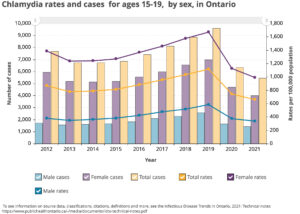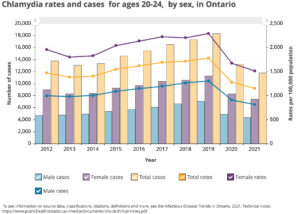

Sexual health knowledge changing at Humber College
HealthHumberNews Mar 5, 2023 Carolyn Burgos Cando

By Carolyn Burgos Cando
Young adults tend to explore their own sexual relationships in their earlier years, but what needs to be explored as well is their sexual health, experts say. Sexual health does not only include how to have safe sex and have a sex-positive relationship, but it includes the physical, mental and social well-being of a person when it comes to sexuality.
At Humber College, the age demographic of students is generally around 17 to 25. At that age, especially if you’re just coming out of high school, people generally do not have a lot of education and knowledge in sexual health and relationships unless someone does their own research.
Chris Mahon from Humber College’s Consent Peer Education Program has said the education that people have is the heteronormative baseline, how sex makes babies, that maybe they should be using a condom during sex, and so on. But there’s also a difference between males and females in heteronormative sex education. Mahon also said women are told that their vagina’s are much more sensitive and for males doctor’s aren’t giving the same type of extensive precautions.
Statistics from Public Health Ontario have shown a trend in rates and cases of chlamydia in Ontario between the ages of 15 to 19 and 20 to 24. For a few years, there was a steady incline of cases in Ontario but then plummeted in 2020. It can also be noted that women had more cases of reporting chlamydia every year compared to men.
Mahon said during the COVID years, people have been able to receive more education on sexual health and relationships through social media. With TikTok being a new social media giant, there have been a wide variety of educational videos, with users falling into the appropriate algorithm quickly finding themselves on the sex education side.
With social media, there’s more of an openness to talk about sexual health and to spread sexual positivity without the fear of intense stigmatization as people are more inclined to look up any concerns or questions they may have. But, there could also be a spread of misinformation so doing further research on what is heard from social media outlets is a must.
Mahon also said that due to COVID, the number of STI cases may have declined as people were obligated to stay in and did not know how to interact with others. That could have impacted the cases seen in the last few years, meaning we could most likely expect an increase in cases in the short-term.
As women are the ones that have a higher case count according to Public Health Ontario, there is concern that men are not as well-informed about sexual health.
Females and non-binary people have shown up more events held by the Consent Peer Education Program compared to men.
“It’s like preaching to the choir…people who know this stuff know it’s important and they’ll show up which is great, we’re always happy to have those folks. We’re still working on reaching the ones who don’t think this is their problem or don’t know much, or that this isn’t their thing,” Mahon said.
With life going back to normal, it’s essential to have more education on sexual health and relationships, especially for males.
At all Humber College campuses, the Consent Peer Education Program has tables and attends services fairs provided by Humber which are open to everyone. Events are designed to be accessible — and fun. On February 17, they screened the movie Easy A to talk about stigma and how you can have healthy relationships.
Learning more about sexual health, sex positivity and relationships may be difficult on to do without knowing where to begin. To keep up with any events, their Instagram handle is @cpepteam.








